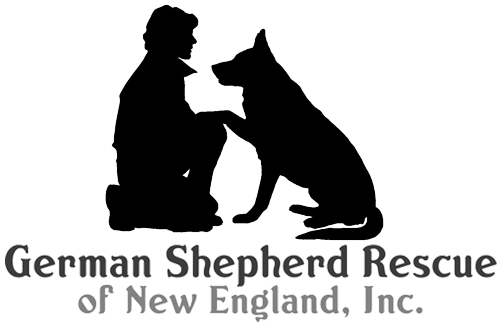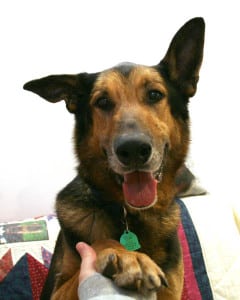No Results Found
The posts you requested could not be found. Try changing your module settings or create some new posts.
#591 Oscar
Oscar is doing well. His Mom told us he’s the super star of his agility classes. He also loves chasing tennis balls!
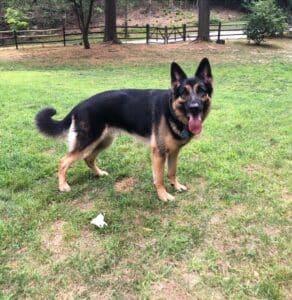
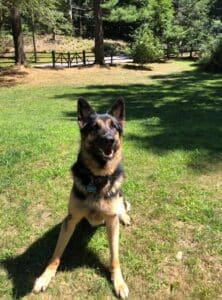
New Foster Dog Announcement
We’ve got a new foster dog!
Thank You!
FOSTER HOME APPLICATION
FOSTER HOME PROCESS
Step 1: REVIEW OUR REQUIREMENTS – Review our Foster Home Requirements to ensure your lifestyle and place of residence meets our guidelines. You must meet these requirements to proceed with the Foster Home Application. Unfortunately, some good homes may be passed up because of these requirements, because GSRNE feels like these requirements are what’s best for everybody involved .
Step 2: FILL OUT OUR FOSTER HOME APPLICATION – Once you’ve reviewed our Foster Home Requirements, fill out our Foster Home Application! GSRNE will review it and follow up with you, if we have any questions. If we don’t have any questions and we feel like you’d be a good fit to foster one of our rescue dogs, we will send you our Orientation Packet for you to review.
Step 3: REVIEW OUR ORIENTATION PACKET – Once you receive our Orientation Packet, read it thoroughly. It will outline what GSRNE’s guidelines are and provide helpful hints when fostering one of our rescue dogs. This packet will help prepare you for what we need from our foster homes, and to make sure that you understand and agree with our guidelines and policies.
Step 4: REFERENCES – We will contact the references that you provided on your Foster Home Application. If we have any follow up questions, we will contact you.
Step 5: SCHEDULE A HOME VISIT – If there are no follow up questions and all the references are checked, we will contact you to set up a Foster Home Visit. For the home visit, we will view the yard, visit the home, and meet your pets. We will also sit down with everyone living in the home to ask some questions, and go over our Fostering Program. Once the process is complete our foster home coordinator will contact you.
If you are unable to foster, or it is not for you, there are many other ways you can help one of our GSDs in need. We are always in need of supplies: see our Wish List of items on Amazon. Check out our Buddy Program where you can help any, all or a specific foster dog in need. Become a Member or Volunteer.
Please remember, we are all volunteers, most of whom work full-time day jobs, have our own dogs and families, and are volunteering out of a desire to make a difference in the lives of needy German Shepherds. We appreciate your patience while we work through the Foster Process.
READ NEXT: Foster Home Application
WHAT GSRNE PROVIDES TO OUR FOSTER HOMES
- All food for the foster dog. We ask that you purchase the food as we are unable to store it and we reimburse you monthly for the expense.
- All “authorized” veterinary care for the foster dog.
- Exact instructions to follow.
- Support and aid for you with any questions you have along the way on your foster dog.
- Loan of crates, feeding and watering dishes, bedding, brushes, toys, leash and collar for the foster dog.
- The knowledge that you are giving a German Shepherd dog extra time to live and another chance to find a loving and safe home!
Most of the items provided to our Foster Homes are generous donations from people like you! If you’d like to help, please visit our Donate page and/or visit our Wish List of items on Amazon.
Please remember, we are all volunteers, most of whom work full-time day jobs, have our own dogs and families, and are volunteering out of a desire to make a difference in the lives of needy German Shepherds. We appreciate your patience while we work through the Foster Process.
READ NEXT: Foster Home Process
FOSTER HOME REQUIREMENTS
GSRNE foster homes must be located in one of the six New England states (Connecticut, Maine, Massachusetts, New Hampshire, Rhode Island, and Vermont). Our foster homes must also be located where GSRNE volunteers can support them. As we add new volunteers our areas of support are growing, however there may still be some locations with too much distance to travel. Please inquire if you have questions about your location.
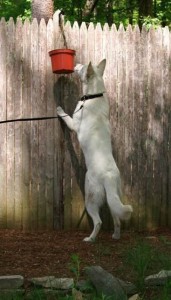
Sassy is safe in her fenced yard
- Any children living in your home must be ten years or older. This is a safety consideration for all.
- If you do not own your home, you need your landlord’s written permission to have a GSRNE foster dog in your home.
- If you live/own a town house or condominium, you will need the association’s written permission to have a GSRNE foster dog in your home.
- If you have roommates in your home, you will need their written permission to foster. In addition, if you are approved as a foster home, your roommate(s) will be required to sign a liability waiver.
- All foster home applicants must have a fenced area attached to their home’s back or side door. The fenced area is for the dog’s safety and your convenience. The fence needs to be a minimum of 4′ high and 5′ high is preferred for most dogs. The fence doesn’t have to be elaborate or expensive, nor does it have to encompass your entire yard. The Invisible Fence alone cannot be used for foster dogs as most German Shepherd dogs will run through the boundary.
- For senior and some special needs dogs, the fencing requirement may be waived as exercise requirements for some of these wonderful dogs can often be fulfilled with leash walks and in-house play.
- If you own a dog, it needs to be at least tolerant of other dogs and you must have the ability to separate the dogs from interacting at times. We want to minimize the risk of fights. If you have more than one dog in your home, you may not be approved to foster as it increases the risk of fights in the home with multiple dogs. It also changes the dynamics of the other dogs in the home.
- If you own a cat(s), small dog, or other small animal (e.g., ferret rabbit, etc.), we may put you on a waiting list to complete the fostering process until we have a dog that is used to living with small animals or does not have a prey drive (chase behavior) to go after the small animal. It is hard to keep the smaller animals from the foster dog.
- If you are currently fostering for another rescue, and you are approved to foster for us, we will wait until your current foster period is over to place a GSRNE foster dog in your home.
- You must agree to follow GSRNE policies and guidelines regarding treatment of and training for the dog.
- Foster dogs legally belong to GSRNE – you cannot show the dog to non-GSRNE adopters or place the dog on your own. If someone is interested in adopting, please ask them to call us at the hotline to apply to adopt. The foster dog may already be matched with an approved adopter.
- We need understanding and patient foster homes to commit to fostering a dog until he/she is placed in a permanent adoptive home. The average placement time for a GSRNE dog is three months, but could be longer depending on many things, like medical care, extra training, and/or finding the right match of an approved adopter for the dog.
If you are unable to foster, or it is not for you, there are many other ways you can help one of our GSDs in need. We are always in need of supplies: see our Wish List of items on Amazon. Check out our Buddy Program where you can help any, all or a specific foster dog in need. Become a Member or Volunteer.
READ NEXT: What GSRNE Provides to our Foster Homes
FOSTERING A DOG FOR GSRNE
German Shepherd Rescue of New England, Inc. (GSRNE) is looking for new foster homes. The number of dogs that we can save depends on the number of foster homes we have.
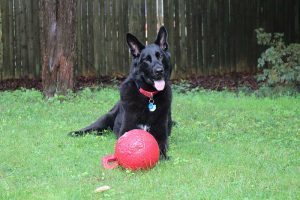
Finn
Becoming a foster home for a rescue German Shepherd dog can be one of the most rewarding activities you will ever engage in. Helping out a dog in its hour of greatest need is also a caring, wonderful way to contribute something meaningful to the German Shepherd breed. If you enjoy working and living with German Shepherds, and love to love them, fostering a rescue dog for GSRNE may be for you!
GSRNE representatives evaluate dogs before they are accepted into our program, and we exclude dogs that have been known to show aggression to humans or that show aggression toward the evaluators. Since this is a snap shot of what we can see about the dog and that the dogs are very stressed out, we do not always get an accurate assessment of the dog. This is why we need foster homes to get a better idea, in a home environment, of what the dog’s personality is like.
Many dogs needing rescue need a better situation or an emergency home right away before euthanasia becomes a reality. Once a rescue dog is evaluated and approved by GSRNE to come into our foster program, the dog goes on a waiting list for the next appropriate foster home that opens up. For shelter dogs especially, this can be a dangerous time. We cannot stress how important foster homes are for these dogs!
Rescue dogs generally range in age from six months to ten years, in colors from black and tan, sable, bi-color, pure black or white. The dogs are usually neutered or spayed before they go to a foster home; if not before, it happens soon after placement in a foster home.
Rescue dogs come from all walks of life! Most come from shelters and pounds, as owner turn ins or strays. Shelter dogs are usually living on borrowed time, and we often need to place them in foster care quickly to help them in time before they are put down.
We work with you to determine what general type of dog will adapt to your household for a successful fostering experience for you and the rescue dog. We provide strong support for you after you take in a dog to foster. In some cases, you may need to work with us often, and in other cases, things may be easier. This all depends on the dog and its needs.
We usually try to give new dogs a bath before they come to you. Sometimes this isn’t possible, but we try to schedule that in for you, especially for dogs that have been kenneled at shelters. We always inspect the dogs for ticks/fleas in their vet exams, and treat for that if it’s an issue, as well.
If you would like to apply to foster a Rescue German Shepherd Dog for GSRNE, please review our Foster Home Requirements. If you meet our requirements, please fill out and submit the Foster Home Application. Once we receive your submitted application, we will review it and contact you with any questions. If all looks good on your application, and your references are checked, we will then schedule a home visit with you and your family members.
If you are unable to foster, or it is not for you, there are many other ways you can help one of our GSDs in need. We are always in need of supplies: see our GSRNE Wish List of Items on Amazon. Check out our Buddy Program where you can help any, all or a specific foster dog in need. Become a Member or Volunteer.
Please remember, we are all volunteers, most of whom work full-time day jobs, have our own dogs and families, and are volunteering out of a desire to make a difference in the lives of needy German Shepherds. We appreciate your patience while we work through the Foster Process.
READ NEXT: Foster Home Requirements
SHOULD YOU GET A GERMAN SHEPHERD DOG?
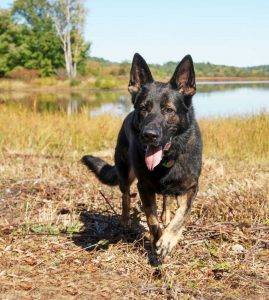
Lex
Before getting a dog, it’s best to think about your lifestyle and your family’s lifestyle.
- Are your hours at home irregular due to work or your social life?
- Do you mind having to always go home after work to let the dogs out, or staying home a lot on weekends to care for and be with your dog?
- Do you plan on traveling a lot in the near future?
- Is your time already precious to you because you have children to concentrate on and must constantly drive to lessons/practices/games already?
- Is everybody in your family excited about adopting a German Shepherd Dog, or would some rather have another breed?
- Are some afraid of large dogs?
- Are you considering getting a German Shepherd Dog as a “watch dog” because you are frequently away on business trips?
- Are you sure your spouse/partner can handle a GSD by his- herself? If not, getting a large dog for somebody who doesn’t want it or cannot handle a large dog alone could be disaster! Don’t force your opinions on your spouse/partner on this issue.
If you answer yes to any of these questions, please reconsider getting a German Shepherd Dog now. Wait until your circumstances change. You’ll be glad you did, and so will any dog you may adopt.
If you feel that your family situation and work hours are conducive to owning a dog, and in particular, a German Shepherd Dog, we’d love to talk to you about adopting a Rescue dog!
NOTE: GSRNE does not adopt out rescue dogs to families with children under 7 yrs of age. You need a fenced area attached to your home for the dog’s safety. Dogs cannot be left outside in the fenced area without direct supervision. These policies arose out of experience.
Why Should I Consider a Rescue German Shepherd Dog?
Plenty of web pages and trainers and vets in the dog world right now recommend that shelter and Rescue dogs are a great choice for ownership. They are right! These GSDs can make some of the greatest companions and pets available, plus, these are dogs that need a good home now. Many who do not find a home in time face an uncertain, sometimes deadly, fate.
Rescue dogs come from many places. Most are given up by their owners who don’t have time for them, who develop allergies to them, who get divorced and have nowhere to keep a dog, or develop financial hardships that preclude dog ownership. Many are given up because of a lack of training from the owners – these dogs get some training during their foster stays with GSRNE. Others are strays and/or are rescued from shelter situations.
GSRNE medically treats any dog that comes into our program for any known problems, as well as updating the dog on shots, testing for parasites and heartworm, and putting the dog on heartworm preventatives. The dog’s basic temperament must meet GSRNE’s guidelines before that dog is accepted into the program. Generally, most Rescue dogs have a known history, and GSRNE volunteers will try to evaluate each dog over some time to try to ascertain whether the dog appears to be good with children, other dogs, cats, etc. During this time, GSRNE volunteers also try to get a handle on the dog’s personality and needs for a successful placement in the right kind of home. We try to brush up on the dog’s housebreaking and household manners as well.
GSRNE believes in finding the right dog for the right family. This is why we have an application and interview process when you apply to adopt a dog. This process is in place to help us help you find the right dog. Personalities and breed traits vary widely in the breed, so every German Shepherd Dog out there isn’t necessarily great for every adopter. Particular types of or individual German Shepherd Dogs are just better for some people than others. Rescue groups like GSRNE can help guide you through this maze to find just the right dog for you and your family. Getting the wrong dog can be quite a travesty – it’s best to figure out what you want and what your family can handle, and then get help in finding a dog like that.
Puppy, or Adult Dog?
Puppies are adorable fluffy, cute bundles of love, there is no question. They are quite hard to resist when you look at them.
They are also extremely time-consuming and can be a lot of work, which most people just don’t expect. Puppies chew items (usually your favorite things), piddle and mess in the house, and need constant supervision. CONSTANT. They are just babies, after all! People often expect puppies to behave as if they were adult, educated dogs. This leads to frustration and disaster.
If you want a puppy, be sure you have the time and patience to deal with housebreaking, crying at night, chewed furniture and other damage a puppy can cause daily. Plan on having no real time for much of anything else you enjoy doing because you must supervise the puppy, for months.
Another point about puppies is, you never know how a puppy will look when it grows up, or its general personality until that dog reaches around 18-24 months old. And don’t forget the puppy energy level. That often doesn’t level off until the dog is between 2 and 3 years old!
If you get an adult dog, you can see the dog’s general personality, and you can also see a mature version of him. Most adult dogs are very adaptable and most will adjust well to your home. Adult dogs can and do bond to new owners quite readily. In fact, German Shepherd Dogs want to bond to an owner strongly, and are very willing to do so to the first person who shows them love and caring. You still need to provide structure, love, and training for an adult dog, as you would for any dog you raise, but the puppyhood chores are over for the most part with most Rescue dogs. And we cannot emphasize greatly enough how wonderful that is.
Puppies are handed over to GSRNE sometimes, but it is a rare occurrence. Most dogs accepted into GSRNE are over a year old. Which is super – you’re already partway through adolescence in a 1 yr old dog. Nothing is better than a dog that is out of adolescence!
If you are looking for a nice dog that knows generally not to chew things, not to scream all night, not to mess in the house…if you’re looking for a dog that you can start obedience training and fun games with right away…for a dog that can stay home all day without a major problem…for a dog that has an adult dog’s comprehension level and attention level…if you’re looking for a dog who needs you as much as you want to want him, consider an adult Rescue dog from GSRNE!
READ NEXT: GSRNE Adoption Requirements
ADOPT YOUR NEW BEST FRIEND!
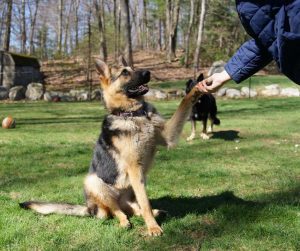
GSRNE works very hard to match the right dog with our adopters, so that you’ll be happy and our dogs will have a forever home.
We place dogs in the six New England states (ME, NH, VT, MA, CT, RI).
- The adoption fee for our dogs is: $450 for dogs over 6 months up to 7 years of age and $550 for puppies up to 6 months of age.
- $250 for seniors, age eight and older & special needs dogs.
The fees help us meet expenses incurred by our nonprofit organization, although our average expense per rescue dog is approximately $2,000 each. These include the following if they have not already been given to the dog before coming into GSRNE’s program:
Spay or Neutering
- They are all spayed or neutered prior to adoption
Vaccines:
- Distemper, Hepatitis, Leptospirosis, Parainfluenza and Parvovirus (DHLPP)
- Rabies
- Bordetella
- Lyme
Tests:
- Heartworm, Lyme, Elrichea, and Anaplasma (4DX)
- Fecal
- Complete blood panel for seniors dogs or dogs that have apparent health issues
Exam:
- Check for any apparent health issues
- Microchip implanted
Flea, Tick & Heartworm Treatment
- Flea, tick and heartworm preventatives
Grooming
- Sometimes our dogs come in needing a grooming (bath and nail clipping) and we try to have this done either before the dog goes into a foster home or when they get to the foster home if the foster home is unable to bathe the dog.
Training
- Some dogs require professional training to work on additional skills and socialization to prepare them for a happy and healthy life.
Boarding
- At times we need to board our dogs. It is usually because the dog needs out of the situation it is in and we don’t have a foster home available.
READ NEXT: Should you get a German Shepherd Dog?
